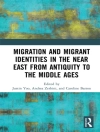The Igbo are one of the most populous ethnic groups in Nigeria and are perhaps best known and celebrated in the work of Chinua Achebe. In this landmark collection on Igbo society and arts, Toyin Falola and Raphael Chijioke Njoku have compiled a detailed and innovative examination of the Igbo experience in Africa and in the diaspora. Focusing on institutions and cultural practices, the volume covers the enslavement, middle passage, and American experience of the Igbo as well as their return to Africa and aspects of Igbo language, society, and cultural arts. By employing a variety of disciplinary perspectives, this volume presents a comprehensive view of how the Igbo were integrated into the Atlantic world through the slave trade and slavery, the transformations of Igbo identities and culture, and the strategies for resistance employed by the Igbo in the New World. Moving beyond descriptions of generic African experiences, this collection includes 21 essays by prominent scholars throughout the world.
Daftar Isi
Abbreviations
Preface and Acknowledgments
1. Introduction
Raphael Chijioke Njoku and Toyin Falola
SECTION I: IGBO INSTITUTIONS AND CUSTOMS AS BASELINE
2. The Kingless People: The Speech Act as Shield and Sword
Hannah Chukwu
3. Igbo Goddesses and the Priests and Male Priestesses Who Serve Them
Nwando Achebe
4. Gender Relations in Nineteenth and Early Twentieth Century Igbo Society
Gloria Chuku
SECTION II: THE IGBO IN THE AFRICAN DIASPORA: THE MECHANICS AND PATTERNS OF MIGRATIONS, SETTLEMENTS AND DEMOGRAPHICS
5. The Aro and the Trade of the Bight
A. E. Afigbo
6. The Trans-Atlantic Slave Trade from the Bight of Biafra: An Overview
Kenneth Morgan
7. The Igbo and African Backgrounds of the Slave Cargo of the Henrietta Maria
John Thornton
8. ‘A Great Many Boys and Girls’: Igbo Children in the British Slave Trade, 1700-1808
Audra A. Diptee
9. Becoming African: Igbo Slaves and Social Reordering in Nineteenth Century Niger Delta Raphael Chijioke Njoku
10. The Clustering of Igbo in the Americas: Where, When, How, and Why?
Gwendolyn Mildo Hall
11. The Demography of the Bight of Biafra Slave Trade, c. 1650-1850
Paul E. Lovejoy
12. The Igbo Diaspora in the Era of the Slave Trade
Douglas B. Chambers
SECTION III: CULTURAL CROSSCURRENTS: DIMENSIONS OF THE IGBO EXPERIENCE IN THE ATHLANTIC WORLD
13. The Igbo Diaspora in the Atlantic World: African Origins and New World
Chima J. Korieh
14. Olaudah Equiano and the Forging of an Igbo Identity
Vincent Carretta
15. Olaudah Equiano or Gustavus Vassa – What’s in a Name?
Paul E. Lovejoy
16. Archibald Monteath: Imperial Pawn and Individual Agent
Maureen Warner-Lewis
17. Igbo Influences on Masquerading and Drum-Dances in the Caribbean
Robert W. Nicholls
18. The Afro-Caribbean Diaspora in Reverse and its Implications for the Development of Christianity and Education in Igboland, Southeastern Nigeria: 1895-1925
Waibinte E. Wariboko
19. The Making of Igbo Ethnicity in the Nigerian Setting: Colonialism, Identity, and the Politics of Difference
Raphael Chijioke Njoku
20. Ethnicity and the Contemporary Igbo Artist: Shifting Igbo Identities in the Post-Civil War Nigerian Art World
Sylvester Okwunodu Ogbechie
21. SNDU: Patterns of the Igbo Quest for Jesus Power
Ogbu U. Kalu
Selected Bibliography
Notes on Authors
Index
Tentang Penulis
Toyin Falola is Frances and Sanger Mossiker Chair in the Humanities and University Distinguished Teaching Professor, University of Texas at Austin. He has written and edited more than 100 books, including The Yoruba Diaspora in the Atlantic World (IUP, 2005).Raphael Chijioke Njoku is Director of International Studies and Chair of the Department of Languages and Literature at Idaho State University.












